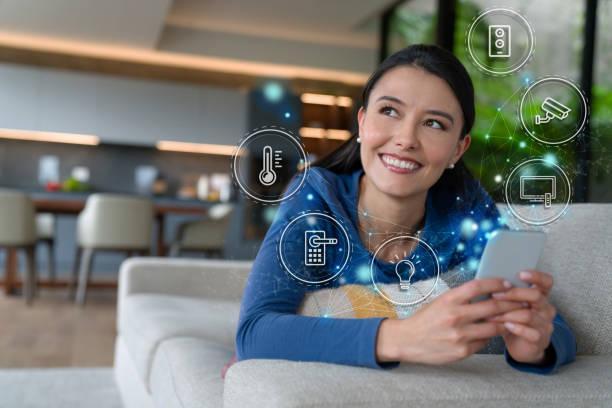The Internet of Things (IoT) is revolutionizing how we connect, communicate, and control our lives. Imagine a world where your refrigerator can order groceries for you and your thermostat learns your schedule to save energy. This interconnected future isn’t just a dream; it’s becoming our reality.
In this article, we will explore the incredible advancements in IoT technology, how it impacts various spheres of life, and what the future holds for this fascinating field. Join us as we uncover the potential of IoT and its implications for everyday living.
“`html
What is the Internet of Things (IoT)?
The Internet of Things (IoT) refers to the vast network of devices that are connected to the internet and can communicate with one another. This includes everything from everyday household items like refrigerators and thermostats to more complex systems such as industrial machinery and smart city infrastructure. Each of these devices collects and shares data, enabling them to have a more profound impact on our lives.
To better understand IoT, consider the following components:
- Devices: These are the physical objects equipped with sensors and software, enabling them to connect and exchange data.
- Connectivity: This involves the various networks that connect IoT devices to the cloud or other devices, such as Wi-Fi, Bluetooth, and cellular networks.
- Data Processing: Data collected by IoT devices is processed and analyzed, often in real-time, to derive meaningful insights.
- User Interface: This is how users interact with IoT devices, whether through mobile apps, web interfaces, or voice commands.
By combining these elements, IoT enables more efficient processes, enhanced automation, and higher levels of convenience in both personal and business contexts. For example, smart thermostats can learn user preferences and adjust settings automatically, leading to increased energy savings.
How IoT is Changing Our Daily Lives
The impact of IoT on our daily lives is profound and multifaceted. As more devices become interconnected, our interactions with technology evolve, enhancing our convenience and productivity in numerous ways.
Smart Homes
One of the most visible applications of IoT is in the smart home arena. Devices such as smart speakers, lights, and security cameras can be controlled remotely via smartphones, giving homeowners unprecedented control over their living environment.
- Energy Efficiency: Smart meters allow users to monitor their electricity consumption, which can lead to more is-efficient energy use and cost savings.
- Home Security: IoT-enabled cameras and sensors can enhance home security, alerting homeowners to suspicious activities in real-time.
Health Monitoring
In the healthcare sector, IoT devices are transforming patient care through remote health monitoring. Wearable devices like fitness trackers and smartwatches collect data about a user’s heart rate, activity levels, and sleep patterns. This data can be used to provide insights into health trends and even alert medical professionals in emergencies.
Transportation and Logistics
IoT has also made significant strides in transportation, improving safety and efficiency. Fleet management solutions utilize GPS and sensor data to monitor vehicle health and optimize routes, ultimately reducing fuel costs and improving delivery times.
Retail Experiences
In retail, IoT enables businesses to personalize offerings based on consumer behavior. Inventory management systems can automatically restock items based on real-time sales data, ensuring that popular items are always available for customers.
Challenges Facing the Internet of Things
Despite its promise, the widespread implementation of IoT faces a number of challenges that must be addressed to unlock its full potential.
Security Risks
Security remains one of the most significant concerns surrounding IoT. With countless devices connected to the internet, the potential for cyber attacks increases exponentially. Hackers can exploit vulnerabilities in unsecured devices to gain unauthorized access to networks, leading to data breaches and other malicious activities.
Data Privacy
Privacy issues also arise from the extensive data collection performed by IoT devices. Users may not fully understand the extent of data being collected and how it is being used. This raises ethical questions about consent and data ownership.
Interoperability
Another challenge is interoperability. Many devices are not designed to communicate with one another, leading to fragmented ecosystems. A lack of standardization can hinder effective implementation and increase costs for consumers and businesses alike.
The Future of IoT: Trends to Watch
As IoT continues to evolve, several trends are shaping the future of this technology. Here are some noteworthy trends to keep an eye on:
Artificial Intelligence Integration
The integration of artificial intelligence (AI) with IoT devices will lead to smarter systems capable of learning from data patterns and making independent decisions. For example, smart traffic systems can utilize AI to optimize traffic flow in real-time, reducing congestion and improving travel times.
Edge Computing
Edge computing is becoming essential for processing data closer to where it is generated rather than transmitting it to centralized cloud servers. This reduces latency and bandwidth usage, enabling faster responses and real-time analytics, which are crucial for applications like autonomous vehicles.
5G Rollout
The rollout of 5G technology will significantly enhance IoT capabilities. With higher speeds, lower latency, and the ability to connect more devices simultaneously, 5G will enable new applications and improve the performance of existing IoT systems.
Increased Focus on Sustainability
As global awareness of environmental issues grows, IoT technologies will play a crucial role in promoting sustainability. Smart grids, for example, can optimize energy use and reduce waste, while smart agriculture solutions can improve crop management and reduce chemical usage.
Discover Innovative Digital Solutions Today!
Are you ready to take your business to the next level? At 50us Digital Marketing Agency, we specialize in transforming your online presence. Our services include:
- Digital Marketing Strategies
- Website Development
- Sales Page Creation
- E-commerce Solutions
- Blog Management
- Paid Traffic Management
Let us help you attract more customers and increase your sales with tailored marketing solutions. Visit 50us Digital Marketing today and follow us on Instagram at @agency50usdigital for the latest updates and tips. We’re here to empower your business and help you succeed!
“`
















